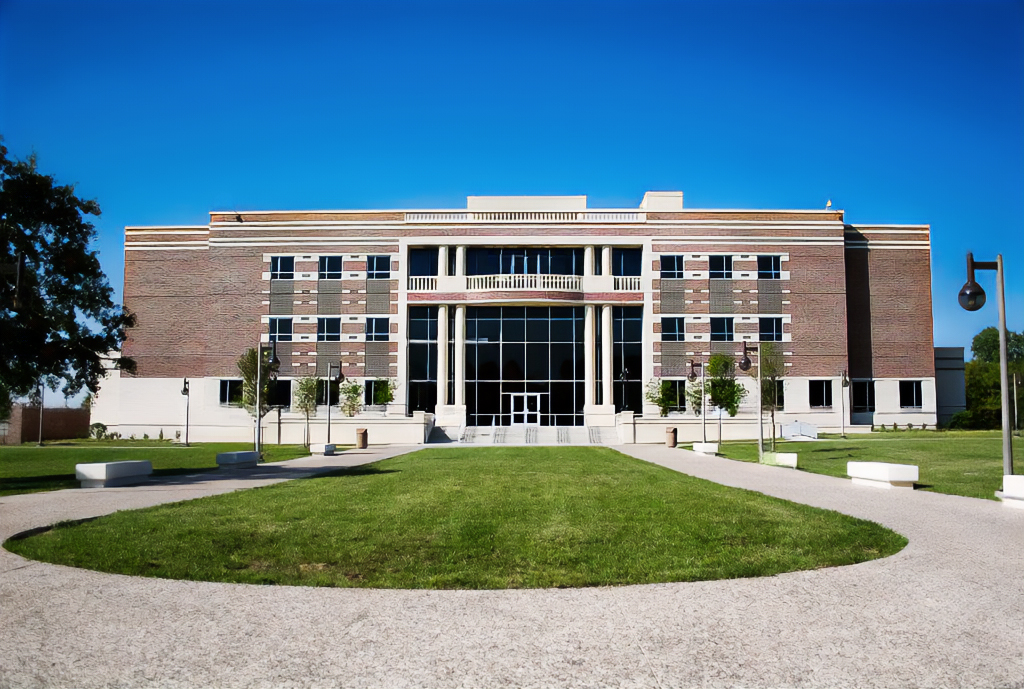PRAIRIE VIEW, Texas (Oct. 20, 2023) – The Don K. Clark Building Auditorium at Prairie View A&M University was bustling with students and various panelists for the first-ever Center for Careers and Professional Development Road Map to Law School event. Students whispered in anticipation about what to expect and why they needed an occasion like this one to reach their dreams.
“I wanted to be a lawyer since I was about 7. I’ve always wanted to help people through pro bono work, so I’m here to get the opportunity to do so,” PVAMU senior criminal justice major Darwin Douglas Jr. said before the pre-law summit began. “I plan to go to law school, but God may have something else for me, so I just want to help people, period.”
Attorneys David Halpern and Alison Kennamer represented the American Board of Trial Advocates and moderated the discussion that incorporated Q&A segments from students in the audience. Texas A&M System Attorney Halpern told the group of aspiring lawyers that law touches every facet of life and that practicing law is an opportunity to help people in one way or another.
While PVAMU does not have a law school, The Center for Careers and Professional Development, in partnership with ABOTA, saw a need to be fulfilled by the University. The purpose of the event was to forge a pathway for aspiring lawyers by bringing pre-law resources to PVAMU students so that they can apply, get accepted, and ultimately graduate from the law school of their choice.
“I just want you to know that career services are here as a resource,” Director of the Center for Careers and Professional Development Dr. Carolyn Davis said before introducing the Assistant Vice President of Student Life and Dean of Students, Dr. Reginald T. Braggs, to the stage.
Dr. Braggs added, “What excites me about this opportunity is how we’re always expanding opportunities for our students in order to help with their education and through different careers.” “I’m very happy that the American Board of Trial Advocates is here,” he said.
The candid conversation on Sept. 28 included topics ranging from finances, Law School Admissions Test resources, sacrifices to reach goals, the importance of networking, and picking a specialty. The event was divided into three panels: admissions and financial aid administrators, students and recent graduates, and ABOTANs who are practicing lawyers.
The first panel included Crystal Ridgley, associate dean of Admissions for Thurgood Marshall School of Law at Texas Southern University, Mario Villa, associate director of Admissions of Texas A&M University Law School, and Alicia K. Cramer, assistant dean of Admissions and Student Engagement of South Texas College of Law.
Ridgley began the discussion by explaining that where you are in your college journey determines where your focus should be and how competitive the application process is.
“If you’re an undergraduate freshman or sophomore, you really want to focus on your grades and your major and focus on performing well. A big part of going to law school is the academic rigor.”
According to Ridgley, it’s important not to study for the LSAT blindly but to have a purpose. It’s also vital to study about a year from when you plan to take your test. Other panelists, Villa and Cramer, also chimed in to explain the necessity to check your application for errors, read the website for information regarding the school, and follow directions.
“I would just add that language is to the law like numbers and math are to engineering,” Villa said about the application process. “Writing is something that you have to do, and we see errors that kind of show that they rushed it or they don’t have strong writing skills.”
The panel of students and recent graduates followed the administrators and was comprised of PVAMU graduate and Texas A&M University Law School graduate Hershel Bowens, University of Houston Law School student Lucy Jayala, and Texas Southern University Thurgood Marshall School of Law student Phoenix Diggs.
“It’s all about sacrifice; figure out what you’re going to give up. For me, not only did I have to eat, but I had three kids I had to feed, Bowens said. “When I started law school, my wife wasn’t working, and I was carrying our family, and she didn’t get a job until about a month before I started.”
Bowens continued to explain that for him, he had to jump out on faith to make law school happen for him. Sacrifice, time management, and how to retain information were common topics among the panelists.
“I went to every office hour that my professors provided, I was at school at 7, I went to tutoring, I read every brief and every case,” Jayala said. “I was studying from 10 a.m. to 10 p.m. Saturdays and Sundays.”
Additionally, during the third panel, the three ABOTANs and practicing lawyers had much to say about breaking gender barriers as women and how they focused on their mindset throughout their law school experience. The third and last panel included Jackson, Mississippi native and partner of Butler/Snow Andrea La’Verne Edney, partner and owner of Wood/Weatherly Trial Law in Denton, Grace Weatherly, and partner of Colvin, Saenz, Rodriguez & Kennamer, Alison Kennamer.
“You can be a mother, go to law school, and do well,” Weatherly said. “If you want to be in big law, it may be a lot harder. It can be done, and you can enjoy it. I enjoyed law school very, very much.”
The resounding refrain was that while law school is challenging, it can be accomplished with the right mindset and preparedness. As the first African-American woman president of ABOTA, Edney continued the conversation by explaining that law school is attainable if you want it.
“It’s about perseverance. The grind is difficult,” Edney said. “Whatever you set your mind to, you can do.”
By Alex Byrd
-PVAMU-

